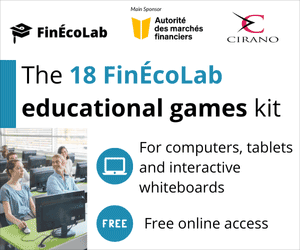Lassonde School of Engineering's three-month pilot project that offered Bodyswaps - an artificial intelligence (AI)-driven, virtual reality (VR) platform that promotes interpersonal skills - to its first-year and co-op students wrapped up March 31.
"We're exploring new ways of learning for students and providing them opportunities to try things and perfect their soft skills, their interpersonal skills, in a safe space," says Tanveer Bhimani, instructional and learning designer in York's Lassonde Education Innovation Studio. "This is a space where they're not being judged [and] where it can just be OK to fail and get good feedback."
Bodyswaps was available to three groups: students in the first-year course Engineering Design Principles (ENG1102) who could earn course credit; co-op students; and those in the work-integrated-learning (WIL) Digital Technologies program at the Markham Campus.
Bodyswaps gives students personalized feedback on their interaction with the platform, something that is almost impossible for professors to do for the more than 850 co-op students and 650 first-year engineering students, Bhimani says. For example, co-op or WIL students might complete a mock interview module to help prepare for job seeking and will get feedback on how to improve. The feedback is personalized and immediate and may include cues for body language and prompts to clarify responses.
Students could also work on their communication, collaboration and conflict management skills, Bhimani says.
The modules aim to bridge the gap between academic qualifications and practical job skills to help students secure job placements. They are designed to be short, interactive sessions (most are 15 minutes with some longer sessions for more in-depth practice), such as the hour-long module on public speaking and presentation skills. Students can repeat modules to continue improving.
Bodyswaps is accessible via computers and VR headsets and is available 24/7, increasing availability and accessibility to students, says Mayolyn Dagsi, manager of co-op programs and business partnerships at Lassonde.
"I think it's particularly helpful because there are students who are hesitant to ask for help, hesitant to do mock interviews with a co-op coordinator right away," she says. "Sometimes co-op interviews come up quickly, and the students have to confirm within 48 hours. Being able to do a module any time and practise while they are waiting for an appointment with their co-op coordinator can help them feel prepared."
It's all part of Lassonde's effort to combine technical expertise and human interaction skills so students are career-ready. In this way, Lassonde is setting a new standard for interactive learning, Bhimani says.
The three-month pilot was funded by eCampusOntario, a not-for-profit organization supported by the Ministry of Colleges and Universities that fosters innovation, collaboration and digital-by-design education in Ontario's colleges, Indigenous institutes and universities.
The project has been well-received, Bhimani says, and Lassonde is interested in exploring whether the model could be applied elsewhere in the University.
"At Lassonde, we see this pilot not as a one-off change, but as part of a shift in how we prepare students for an evolving work world," says Sal Paneduro, director of educational innovation at the Lassonde School of Engineering.
"By integrating AI-powered experiential learning in first-year design courses, co-op readiness and the Digital Technologies fully work-integrated program at Markham Campus, we're building an ecosystem where human interaction skills are developed with the same intentionality as technical ones.
"This isn't just educational technology," says Paneduro. "It's a new approach to designing immersive learning systems that are aligned with the future of engineering and science practice."
This story was originally featured in YFile, York University's community newsletter.













